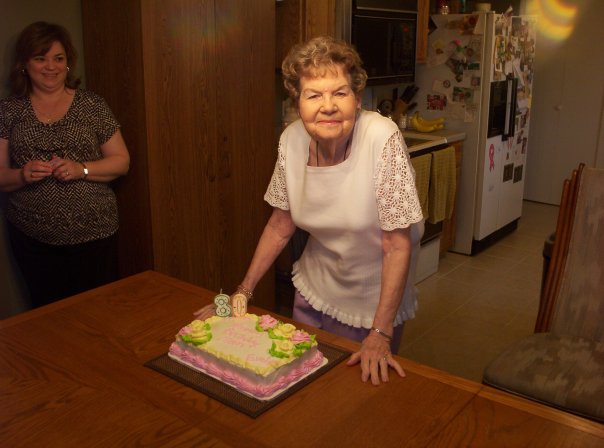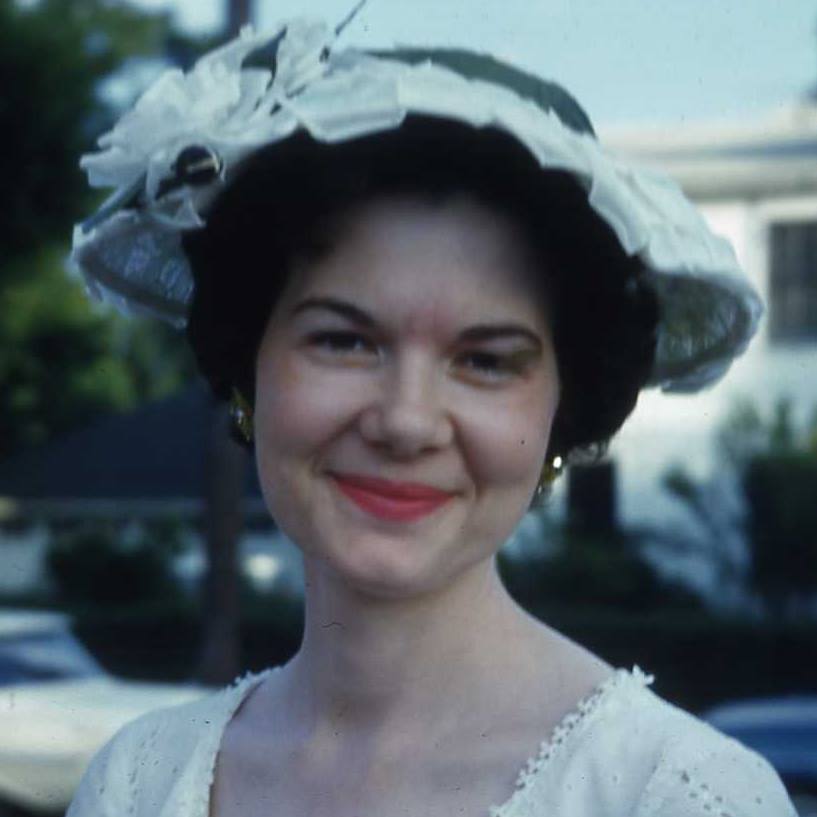My mother was a high-school beauty queen. A baby-faced brunette with a mind as good as her looks, she was baptized in a river, grew up on a Depression-era farm, and moved to Smalltown, U.S.A., at the end of World War II. In 1947 she married a dashing Army Air Corps vet, bore him two sons, and spent the greater part of the next half-century working for a string of Smalltown accountants. Hers, I suppose, was a nominally uneventful existence, at least when judged by the short-sighted standards of the world. Yet Evelyn Teachout, who died peacefully last night after a long illness, loved her life and made a deep impression on everyone who met her, for she was a quick-witted, thoroughly decent person whose kindness and generosity were self-evident.
Not surprisingly, I adored her, in part because she was good without being insipid. She could be blunt, but never cruel, and I never heard her speak a hurtful or thoughtless word, to me or anyone else. As I once wrote in this space, “She showed me how to laugh, admired my achievements, brushed off my failures, assured me whenever necessary that pretty much anything I wanted to do in life would be fine with her, and never left me in the slightest doubt of her love….You can’t get much luckier than that.”
Whenever she came to New York, I did my best to make each trip an adventure. It was in my company that she first saw a painting by Rembrandt and a ballet by George Balanchine. Her increasingly fragile health, alas, meant that these trips were few and far between, so I called her most nights from wherever I happened to be–she liked it when I called her from a cab en route to a Broadway show–and visited her in Smalltown two or three times a year. My guess is that she liked that much better than coming to see me, for she was never drawn to city life. She lived in the same house for a half-century, and the longer she lived there, the more she appreciated it. “She draws strength from that house,” my brother told me once.
 My mother outlived my father by fourteen years. During that time chronic pain (she suffered from debilitating back problems) reduced her to a shadow of the tough, vital woman who raised my brother and me. At length it became clear that her memory was going, too, and a neurologist confirmed what we feared most: dementia was setting in. But she responded immediately and strongly to medication, so much so that she was able to continue living at home, and she made no secret of her hope that she would die before that ceased to be possible.
My mother outlived my father by fourteen years. During that time chronic pain (she suffered from debilitating back problems) reduced her to a shadow of the tough, vital woman who raised my brother and me. At length it became clear that her memory was going, too, and a neurologist confirmed what we feared most: dementia was setting in. But she responded immediately and strongly to medication, so much so that she was able to continue living at home, and she made no secret of her hope that she would die before that ceased to be possible.
Would that it had been so, but she became grievously ill last summer, and three emergency operations forced her into a nursing home that she never again left for more than a few hours at a time. Fortunately, I was able to visit her more than once while she was still herself, taking the opportunity to tell her repeatedly what she already knew, which was that I loved her with all my heart. So, too, did Mrs. T, who came to know and cherish my mother late in her long life, and to admire the courage with which she faced the cruel illnesses that beset her.
As for David and Kathy, my brother and sister-in-law, the selfless and uncomplaining devotion with which they cared for my mother in the last year of her life is more moving–and inspiring–than I can possibly say. They were wholly responsible for the grueling day-to-day task of making sure that she was as comfortable as she could possibly be. Because I live in Manhattan, I was unable to do much more than cheer them on at a distance, flying back to Smalltown as often as I could, which wasn’t nearly often enough. Now they will live in the house where David and I grew up, for which I am profoundly grateful.
My mother’s last public appearance was at the wedding of Lauren Teachout Dukes, her granddaughter and my niece, in October of 2011. Though she needed all her fast-waning strength simply to be there, she left the ceremony knowing that she was greatly loved, not just by her family but by all who knew her. Her life was a blessing.

